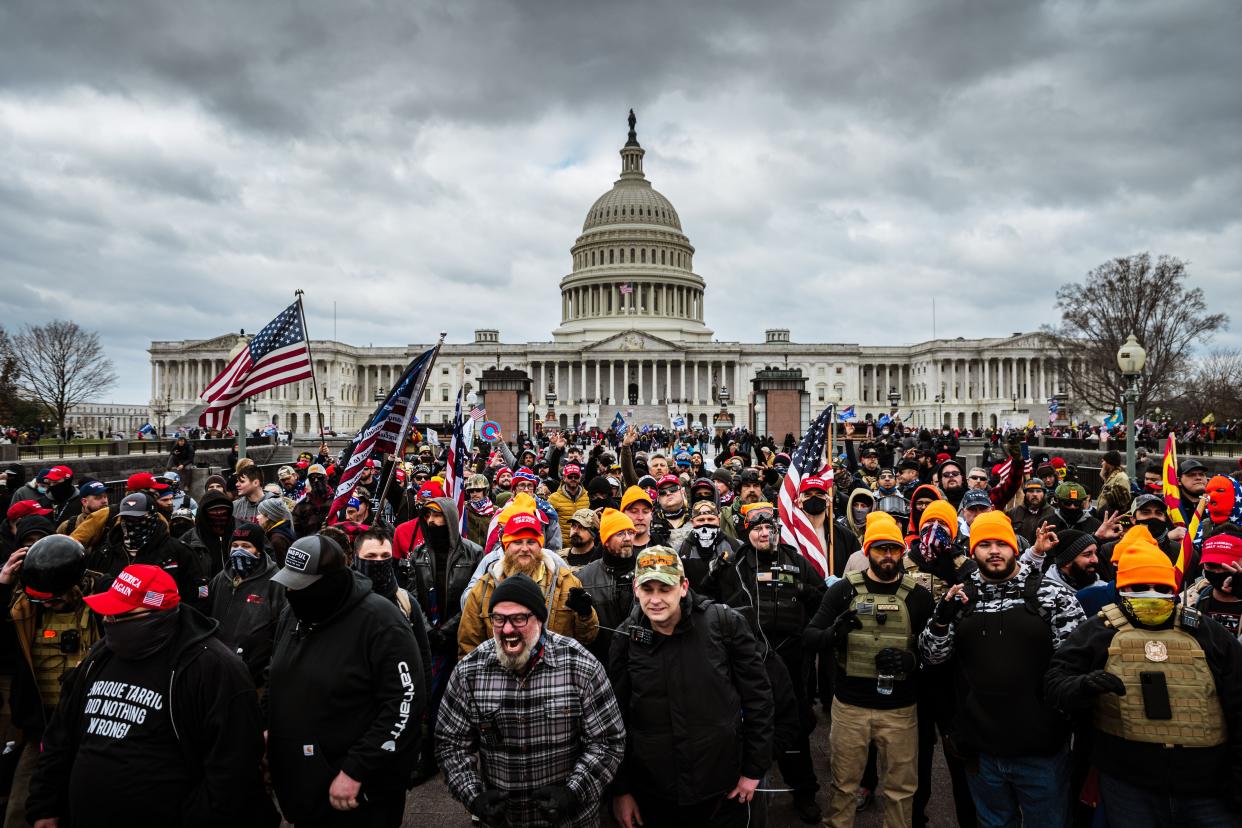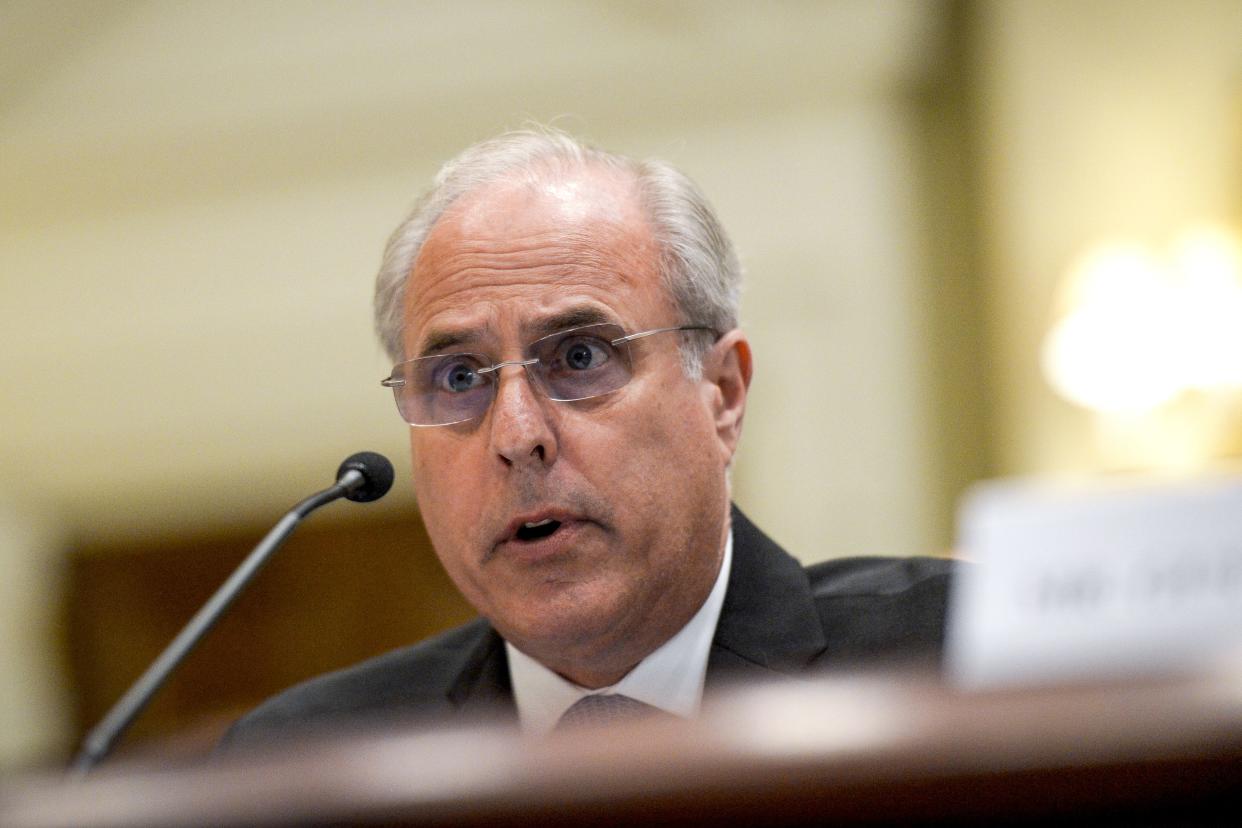Capitol Police ordered not to use ‘heavier munitions’ on Jan. 6: watchdog
A senior U.S. Capitol Police official told officers to not use common riot weapons against the Trump supporters who stormed the historic building in January, likely hampering their ability to push back the belligerent mob, the department’s internal watchdog testified before Congress on Thursday.
Michael Bolton, the Capitol Police inspector general who has for months been investigating the security failures that paved the way for the deadly Jan. 6 attack, told members of the House Administration Committee that an unnamed assistant deputy chief made the call to not deploy nonlethal riot weapons like 40-mm. munition grenade launchers.
“It was decided that these heavier munitions — specifically sting balls, 40-mm. — were not to be utilized, based on that they could potentially cause life-altering injury and/or death,” Bolton told lawmakers in his first testimony since he began investigating the Jan. 6 assault.
Bolton said he took issue with the assistant deputy chief’s decision.
“Our feeling is that, well, anything that you give a police officer can be misused and, if misused, can cause life-altering injuries and/or death. The takeaway from that is let’s provide the training to our officers so that they are used appropriately,” he said.

Weapons like 40-mm. munition grenade launchers are regularly used by police to break up riots and civil unrest. Riot cops deployed such weapons against Black Lives Matter protesters in cities across the country last summer.
Asked if he believes the assistant deputy chief made the wrong call, Bolton said it’s undeniable that officers would have been in “a better posture” to repel the Jan. 6 insurrectionists if they had access to riot weapons.
“It would be very difficult to say it would’ve turned the tide, but it certainly would’ve given them a better chance,” Bolton said, adding that 40-mm. munitions are “very painful” and likely would’ve forced some of the attackers to retreat before they were able to smash their way into the Capitol.
Bolton’s testimony is part of a wide-ranging effort by various congressional committees to get to the bottom of how Trump supporters were able to storm the Capitol on Jan. 6, kill a police officer and desecrate the halls of Congress in a violent bid to stop the certification of President Biden’s election. The attack unfolded shortly after Trump urged supporters at a rally near the Capitol to march on the building and “fight like hell” to stop the certification.
A classified 104-page report compiled by Bolton’s office and leaked to several media outlets this week faults Capitol Police leadership for failing to act on alarming intelligence in the days leading up to Jan. 6, including an FBI memo concluding that far-right extremists were gearing up for “war.”
Bolton, who has been tasked with making recommendations for improving congressional safety, testified that the top priority should be for the Capitol Police department to beef up its intelligence capacities.
“We need an intelligence bureau,” he said. “It needs to be a full service, comprehensive bureau.”

Beyond slacking on intelligence operations, Bolton wrote in his report that the Capitol Police department was woefully unprepared for a breach like Jan. 6 from a logistical standpoint.
Equipment like tear gas launchers, riot shields and other protective gear was substandard, expired and stored poorly, the IG found. Many officers who responded to the Jan. 6 attack had not completed training on crowd control, and there was a lack of direction from the civil disturbance unit, a part of the department responsible for preventing the exact type of chaos that happened on Jan. 6, Bolton said.
Some of the issues referenced by Bolton remain to this day, he said in the report.
In a statement Thursday, Capitol Police said that’s because “nearly all” of Bolton’s “recommendations require significant resources the department does not have.”
Members on both sides of the aisle committed during Thursday’s hearing to work toward providing Capitol Police with better resources.
“I’m incredibly concerned with the [Capitol Police’s] lack of ability to manage and interpret the intelligence they are getting from other agencies,” said Illinois Rep. Rodney Davis, the administration committee’s top Republican.
